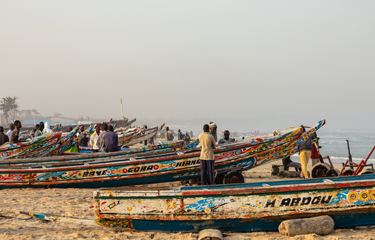Local fisheries group in Senegal decries influx of Chinese trawlers

A wave of new licenses allowing Chinese vessels into Senegalese waters will “annihilate” the country’s efforts to get its fisheries on a sustainable footing, according to a group representing local small-scale fishermen.
The Senegalese organization Groupement des Armateurs et Industriels de la Pêche au Senegal (GAIPES) is fighting a campaign to block the licensing of 53 trawlers – most of them Chinese-owned – from gaining rights to fish inside of Senegal’s exclusive economic zone.
Alassane Dieng, head of the group, which represents local fishing interests, said the potential licensing of a large number of vessels with foreign affiliations will harm projects aimed at restoring resources, such as newly implemented management plans and artificial reefs. Dieng said the vessels represent a threat to protected fishing areas and sustainable fishing practices, pointing to violations of local laws attributed to foreign-owned vessels fishing in African waters.
Dieng told SeafoodSource his organization is seeking to assemble a coalition at home and internationally “to protect local artisanal and industrial resources, ecosystems and fishermen, for the benefit of the Senegalese populations of present and future generations, particularly in these times of pandemic and in the aftermath of COVID-19.”
Dieng criticized a lack of transparency in the Senegalese government’s licensing process, as it has not published a list of vessels by flag and ownership that have been licensed to operate in Senegalese waters.
“These are generally companies governed by Senegalese law, for which one would be entitled to ask questions with regard to certain elements contained in the license request dossier submitted to the licensing advisory committee,” he said.
The GAIPES director also questioned why “a series of Chinese vessels of the same patronym with successive numbers are distributed in groups of six or 10 as belonging to two or more companies.”
“In effect, one doesn’t know the number of licenses given in 2018, 2019, or 2020,” Dieng said. “The massive requests for authorization to fish and to Senegalize Asian-sounding vessels is in flagrant contradiction with the enormous efforts and sacrifices,” made by the state and local actors, helped by development partners, to conserve fishing stocks, he said.
Assisted by donations from USAID, GAIPES has worked to improve protections of fisheries and the improvement of the state of Senegal’s small-scale fishing micro-economy. But Dieng said his organization "fears the worst" due to bad experiences from the past regarding government licensing of boats from South Korea and Russia – as well as the granting in 2018 and 2019 of a dozen licenses to recently-naturalized Chinese vessels in what Dieng said was a contravention of the Senegalese fishery law.
SeafoodSource has contacted the Senegalese government for comment but had not received a response as of 6 May.
Photo courtesy of Curioso.Photography/Shutterstock






Share